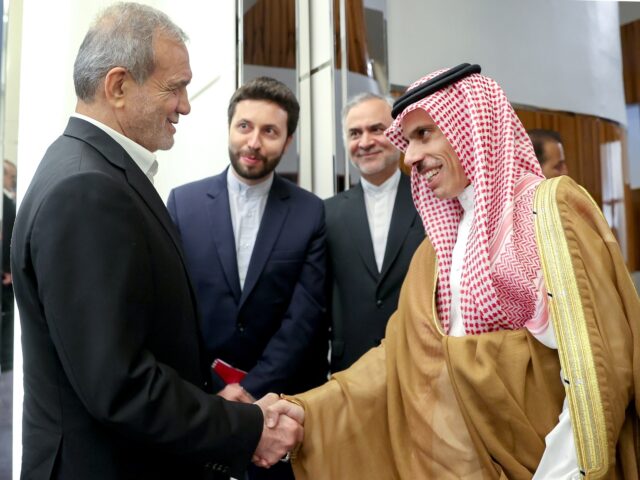Iranian President Masoud Pezeshkian was welcomed in Doha, Qatar, on Wednesday for a meeting with Saudi Foreign Minister Prince Faisal bin Farhan, where they reportedly discussed the dangers of regional escalation.
Iran did a fair bit of “escalating” on Tuesday by launching 180 ballistic missiles at Israel.
The meeting between Pezeshkian and Faisal seemed primarily intended to preserve the diplomatic rapprochement between the two rival powers brokered by China in March 2023, at a moment when Iran’s illegal attack on Israel threatens to touch off a major war. Tehran seems a bit nervous that the Saudis might not support them in such a conflict.
In fact, the Gulf states held an emergency meeting of foreign ministers in Doha on the same day Pezeshkian visited, and they probably were not chatting about how happy the Iranian attack on Israel made them.
The Saudis, in particular, are hoping to tamp down the Gaza and Lebanon conflicts as part of a peace deal with Israel that would include Palestinian statehood, and perhaps diplomatic recognition from Riyadh as a sweetener for the Israelis.
None of the Gulf Cooperation Council (GCC) states has endorsed Iran’s missile attack on Israel and some of them have quietly suggested they fear Iran has invited the Israelis to throw a knockout punch at Tehran, potentially sending the oil industry into turmoil and inflaming Sunni-Shiite tensions across the Middle East.
Pezeshkian assured Faisal on Wednesday that Iran’s strikes against Israel are over, provided Israel does not respond.
“We are not in pursuit of war with Israel. They promised us peace. But Israel has terrorized our guests in Tehran during our presidential inauguration. We want to establish peace. If you disagree, peace will not be established,” Pezeshkian said at a press conference in Doha.
By “guests in Iran” he meant the Hamas terrorists Tehran has been protecting, particularly Ismail Haniyeh, the Hamas political leader killed in Tehran in July by a bombing generally attributed to Israeli agents.
Pezeshkian was unapologetic for the Iranian missile attack and unwilling to admit that it appears to have inflicted very little actual damage on Israeli forces.
“The recent decisive actions of our armed forces were a legitimate response to Israel’s ongoing crimes, following its unfulfilled promise of a ceasefire in Gaza in exchange for restraint from the Islamic Republic of Iran,” he declared.
Faisal was more conciliatory, saying the Saudi government wishes to “permanently close the chapter on our differences and focus on resolving issues, developing relations as two friendly and brotherly countries.”
“We trust in your wisdom and insight in managing the situation and contributing to peace and stability in the region,” Faisal told Pezeshkian, which seemed like both a promise not to give Iran a hard time about launching 180 missiles, and a suggestion that it should not launch any more.
Pezeshkian pressed the Saudis to take a stronger stance against Israel, repeatedly insisting that Muslim states should be “brothers” who band together with their “brothers and sisters” in Gaza and Lebanon to oppose the “Zionist regime.”
“If we do not unite and get together against this aggression today in Gaza and Lebanon, and tomorrow it will be the turn of other cities and Islamic countries,” the Iranian president insisted.
Pezeshkian, of course, said nothing about Iran’s terrorist proxies starting the war by attacking Israel from both Gaza and Lebanon, or the Iranian clients who escalated the conflict by attacking Americans in Iraq and international shipping in the Red Sea.
The Qatari government was more outspokenly critical of Israel than its GCC guests, adopting a tone closer to Pezeshkian than Faisal.
“The recent surge of conflict in Lebanon is what we have been warning against since the beginning of Israeli aggression,” said Qatari Emir Sheikh Tamim on Wednesday.
The emir called on Israel to “cease its unjust war in Gaza, and the West Bank and its aggression on Lebanon.”
Meanwhile, the Israeli military escalated its operations in Lebanon against Hezbollah, which has launched hundreds of indiscriminate rocket attacks against Israeli civilians since the Hamas attack on October 7.
On Thursday, the Israel Defense Forces (IDF) ordered villagers in southern Lebanon to evacuate the area north of the United Nations buffer zone established after the previous Israel-Hezbollah conflict in 2006. The warnings suggested Israel plans to broaden its campaign against Hezbollah, which is reeling from targeted strikes and bombings that wiped out much of its leadership over the past two weeks.
Hezbollah organized a tour of southern Beirut for journalists on Wednesday to view the destruction from Israeli strikes.The Lebanese Health Ministry claimed over a thousand people have been killed by Israeli bombardments over the past week, and up to a million people have been displaced from their homes.

COMMENTS
Please let us know if you're having issues with commenting.